Stories about...Cena y Ciencias
I-STEM articles about Cena y Ciencis, organized in descending order chronologically.
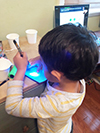 At Cena y Ciencias, Illinois Scientists Shine a (UV) Light on Fluorescence
At Cena y Ciencias, Illinois Scientists Shine a (UV) Light on Fluorescence
May 7, 2021
What is fluorescence? What causes it? On May 3rd, during the final Cena y Ciencias (CyC) outreach of the semester, students from Dual Language programs in several local schools got a chance to explore the unique property. Shedding light on the subject during the virtual (Zoom) outreach, and demonstrating the hands-on activities, were several native-Spanish-speaking scientists from Illinois. In addition to teaching kids some science and leading some fun hands-on activities—all taught completely in Spanish—the scientists also served as role models, demonstrating for the youngsters that if people who come from similar backgrounds and speak in their language can be scientists, they can too.
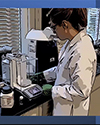 Virtual Cena y Ciencias Provides Hispanic Role Models, Encourages Hands-on “Kitchen Science”—All Done in Spanish
Virtual Cena y Ciencias Provides Hispanic Role Models, Encourages Hands-on “Kitchen Science”—All Done in Spanish
November 12, 2020
Why does holding your nose when taking medicine make it not taste as bad? What is surface tension on liquids? What do scientists do in labs? What are crystals and how do they form?
Noted above are just some of the questions I-MRSEC’s Virtual Cena y Ciencias (CyC) hopes to answer during its Spanish-language, science outreach events for local Hispanic and dual-language-program school children. But, to adhere to COVID-19 social distancing mandates, CyC, scheduled for the first Monday of the month throughout the fall 2020 and spring 2021 semesters, is being held online until further notice. Despite the change of venue, the COVID-19-friendly events, like their no-social-distancing-required predecessors, feature lectures and/or demonstrations followed by hands-on science—with a caveat. The "kitchen science" activities feature science that can be done with materials available in most homes. Plus, in addition to the exposure to science, the youngsters will experience it in Spanish, offered by Hispanic scientists who serve as role models.
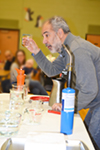 Cena y Ciencias—Science Demonstrated in Spanish by Hispanic Role Models
Cena y Ciencias—Science Demonstrated in Spanish by Hispanic Role Models
March 11, 2020
“We use language as a powerful tool to connect with the communities and provide an example for the children.” – Felipe Menanteau
Felipe Menanteau teaches the youngsters at Cena y Ciencias about heat and temperature. Felipe Menanteau teaches the youngsters at Cena y Ciencias about heat and temperature. Pizza. Exciting demos (including one featuring a blowtorch!). Hands-on activities related to temperature. These are some of the fun things a group of Kindergarten through 5th graders from two Urbana elementary schools, Dr. Preston Williams and Leal, experienced at Cena y Ciencias (Supper and Science) on March 2nd. The evening at Williams was comprised of supper (pizza) followed by, of course, science related to the night’s theme: “Put to the Test of Fire: Materials That Protect Us.” However—probably most important of all—the night’s activities were all conducted in Spanish by scientists of Hispanic heritage.
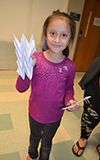 Cena y Ciencias Exposes Hispanic Elementary School Students to Materials Science at MRL
Cena y Ciencias Exposes Hispanic Elementary School Students to Materials Science at MRL
April 29, 2019
As part of I-MRSEC’s Cena y Ciencias (Spanish for “Supper and Science”) outreach program, a group of mostly Hispanic K–5 students and their families followed a supper of free pizza at Urbana’s Dr. Preston Williams Elementary School with a visit to the Materials Research Lab (MRL) for the second and equally-as-fun part of the evening—some science. During the April 1st event, the visitors not only participated in a variety of materials-related, hands-on activities, but they also got to interact with Illinois students and staff. Also, since many of those presenting were Hispanic and were leading the activities in Spanish, the youngsters also got to see scientists who look like them and who speak their language.
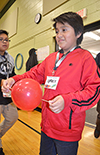 Polímeros! Cena y Ciencias Program Teaches About Materials Through a Supper & Science Night
Polímeros! Cena y Ciencias Program Teaches About Materials Through a Supper & Science Night
November 14, 2018
A group of around 80+ mostly Hispanic K–5 students and their families showed up for the November 5th Cena y Ciencias (Spanish for “Supper and Science”) at Dr. Preston Williams Elementary School in Urbana. Supported through University partners that include the Illinois Materials Research Science and Engineering Center (I-MRSEC) and the Illinois chapter of the Society of the Advancement of Chicanos and Native American Scientists (SACNAS), as well as Urbana School District employees, and parents, the program is addressing materials such as polímeros (Spanish for polymers)—the star of the November outreach. And while the free pizza most likely provided some incentive for families to take part, based on the youngsters’ excitement, it was apparent that participating in different hands-on science activities led completely in Spanish was their main focus during the evening.
 Cena Y Ciencias: Supper and Science…and Role Models, Courtesy of SACNAS
Cena Y Ciencias: Supper and Science…and Role Models, Courtesy of SACNAS
May 18, 2015
The program, called Cena y Ciencias (it’s Spanish for Supper and Science), meets on Monday nights once a month. For supper, there's pizza. The science is presented by Illinois graduate students who are all SACNAS members. For the April session, the science was a hands-on activity about acid-base reactions. Wearing the conventional garb of scientists—white lab coats—the grad students shared their passion for science with excited Leal and Prairie School students who clustered around them, eagerly learning about acids and bases while glibly chattering in Spanish.













.jpg)
















